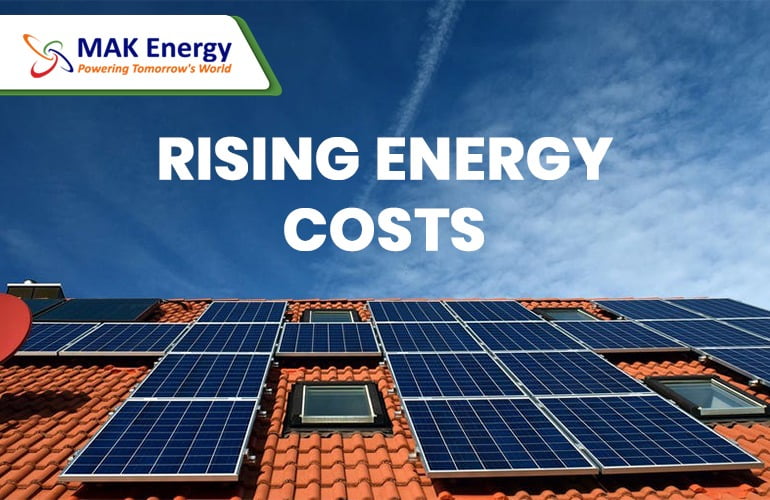Last updated: July 12th, 2023 at 10:05 am
As the cost of traditional energy sources continues to rise, businesses across the UK are looking for alternatives to keep their energy bills under control. One of the most popular options available to them is solar power, which not only offers a clean and sustainable source of energy but also helps businesses to protect themselves from rising energy costs.
In this blog, we will explore how solar energy can protect businesses from rising energy costs, the benefits of switching to solar power, and what businesses should consider when making the switch.
Rising Energy Costs
The cost of traditional energy sources like coal, oil, and gas has been steadily increasing over the past few years due to various factors such as market forces, geopolitical events, and environmental regulations. This trend is expected to continue in the future, making it difficult for businesses to predict their energy costs and plan their budgets accordingly.

For businesses that rely heavily on energy-intensive processes, such as manufacturing or data centers, rising energy costs can have a significant impact on their bottom line. In addition, businesses that operate in regions with volatile energy markets or limited energy supply can also face challenges in securing affordable energy.

Benefits of Solar Energy for Business
Solar energy, on the other hand, offers a number of benefits that can help businesses to mitigate the risks associated with rising energy costs. Firstly, solar power is a renewable source of energy that is abundant and widely available. Unlike traditional energy sources, which are finite and subject to market forces, solar energy can be harnessed anywhere in the world, making it a reliable source of energy for businesses.
Secondly, solar power is a clean source of energy that produces zero emissions and has minimal impact on the environment. By switching to solar power, businesses can reduce their carbon footprint and contribute to a more sustainable future. This can also help businesses to meet their sustainability goals and comply with environmental regulations.
Thirdly, solar power can provide businesses with energy independence and security. By generating their own energy on-site, businesses can reduce their reliance on the grid and protect themselves from energy price volatility and supply disruptions. This can also provide businesses with greater control over their rising energy costs and help them to budget more effectively.
Finally, solar power can provide businesses with long-term cost savings. While the upfront costs of installing a solar system can be significant, the long-term benefits of solar power can far outweigh the costs. Solar panels have a lifespan of 25-30 years and require minimal maintenance, making them a cost-effective solution for businesses that are looking to reduce their rising energy costs over the long term.
Considerations for Switching to Solar Power
While the benefits of solar power are clear, businesses that are considering switching to solar power should consider a few key factors before making the switch. These include:
- Energy Consumption: Before installing a solar system, businesses should evaluate their energy consumption to determine the size of the system that is required. This can help businesses to estimate the costs and savings associated with solar power and ensure that the system meets their energy needs.
- Space Availability: Solar panels require a significant amount of space to operate effectively. Businesses should evaluate their available space to determine whether they have enough roof or ground space to accommodate the system. They should also consider any shading or obstructions that may impact the system’s performance.
- Financing Options: The upfront costs of installing a solar system can be a significant barrier for many businesses. However, there are several financing options available, including loans, leases, and power purchase agreements, that can help businesses to finance the system and make the switch to solar power more affordable.
- Regulatory Considerations: Businesses should also consider any regulatory requirements or incentives that may impact their decision to switch to solar power. In the UK, there are several incentives available, including the Feed-in Tariff (FIT) scheme and the Renewable Heat Incentive (RHI),which can help businesses to offset the costs of installing and operating a solar system. In addition, businesses should ensure that their solar system complies with all relevant regulations and standards to avoid any legal or safety issues.
- Maintenance and Repairs: While solar panels require minimal maintenance, businesses should still plan for occasional maintenance and repairs to ensure that their system operates effectively over its lifespan. Businesses should also ensure that they have access to qualified professionals who can perform these tasks and provide support if any issues arise.
Solar power offers a compelling solution for businesses that are looking to protect themselves from rising energy costs. By generating their own energy on-site, businesses can reduce their reliance on traditional energy sources, protect themselves from energy price volatility and supply disruptions, and contribute to a more sustainable future.
However, businesses that are considering switching to solar power should carefully evaluate their energy consumption, space availability, financing options, regulatory considerations, and maintenance needs to ensure that they make the right decision for their business.
Overall, solar power represents a smart and sustainable investment for businesses across the UK, providing them with a reliable and cost-effective source of energy that can help them to thrive in an increasingly challenging business environment.




